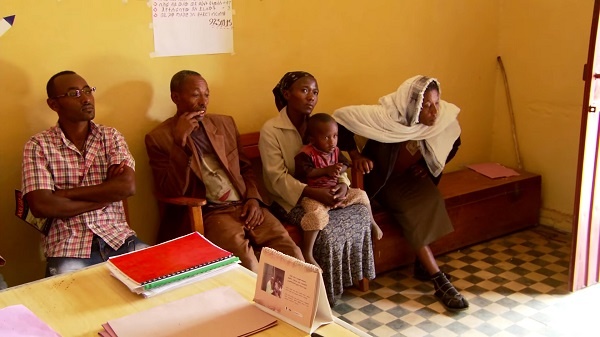
The World Health Organization has supported the Ministry of Health and Ethiopian Health Insurance Services through capacity building to ensure the successful implementation and continuity of community-based health insurance
ADDIS ABABA (WHO Africa) – In late 2019, 68-year-old Meseret Belay, who lives in the Meshwalekiya neighborhood of Ethiopia’s sprawling capital, Addis Ababa, suffered a severe stroke that left her unable to speak and paralyzed on the left side of her body.
Suddenly incapable of caring for herself or managing the small local diner she had run from her home, Meseret now had to depend on her daughter, Misrak Fisseha, herself a single mother to a nine-year-old daughter, for support. Misrak accompanied her mother on the countless hospital visits that followed the stroke, during which Meseret underwent various tests and was prescribed medication to lower her blood pressure and cholesterol.
This unforeseen health catastrophe also incurred significant out-of-pocket expenses. “I must have spent around 13 000 Ethiopian Birr (US$ 250) in the beginning for tests, transport, physiotherapy and medication,” Misrak says. “I love my mother dearly and would do anything in my power to nurse her back to health, but I began to worry that the costs would eventually surpass my means.”
- See also: Ethiopia funds Coalition for Epidemic Preparedness Innovations (CEPI) to combat spread of epidemics
After six months of spending around 10% of her monthly income of just 10 000 Ethiopian Birr (US$ 200) on check-ups and treatment, Misrak was encouraged by a friend to enroll her family in the Ethiopian government’s community-based health insurance (CBHI) scheme. As a result, since November 2019, Misrak’s mother’s ongoing medical requirements have been entirely covered by the scheme, including all consultations, tests, and any prescribed medication. The same has applied for any of Misrak’s daughter’s and her own health needs. “This has really helped our family to stay afloat,” Misrak says. “I can now care for my mother and raise my daughter without having to worry about how to pay for medical expenses.”
The CBHI scheme seeks to put an end to debilitating and potentially devastating out-of-pocket health expenses for the approximately 85% of Ethiopians who work in the informal sector. As such, it is a key component of the country’s pursuit of universal health coverage, a target set by countries during the adoption of the United Nations Sustainable Development Goals in 2015. Households with members employed in the formal sector, meanwhile, will soon be included in a mandatory social health insurance scheme that is in the final stages of launching.
Run by local district-level government with the guidance and financial support of the Ministry of Health and the Ethiopian Health Insurance Services, the CBHI scheme was first piloted in 13 woredas (districts) in 2010 and has since expanded to cover almost all the 832 woredas in the country. Members pay a small yearly premium payment of 500 Ethiopian Birr (US$ 10), while there is a reduced fee of 240 Ethiopian Birr (around US$ 5) for dependents aged above 18 years.
Between 2015 and 2020, almost 7 million households, equating to 32 million people, enrolled in the scheme. About 5.5 million of these households were members paying the yearly premium, while the remaining 1.5 million households were sponsored by the government. Over the same period, the number of new consultations in all health facilities by CBHI beneficiaries increased by over 200%.
As of 2020, 1920 health centers and 245 hospitals nationwide are contractually providing health services to CBHI beneficiaries. In addition, about 15% of these health facilities have established contractual agreements with third-party providers such as the Red Cross, Kenema Pharmaceutical Enterprise and other private and public pharmacies to fill gaps in the availability of essential medicines in health facilities.
“Ethiopia is making promising progress towards universal health coverage. One of the ways we are doing this is by protecting our people from the financial consequences of paying for health services out of their own pockets through the community-based health insurance scheme, ensuring they access the services they need without being pushed into poverty,” says Dr. Muluken Argaw, the Deputy Director General of the Ethiopian Health Insurance Services.
World Health Organization (WHO) has supported the Ministry of Health and Ethiopian Health Insurance Services through capacity building to ensure the successful implementation and continuity of CBHI. In March 2022, WHO, World Bank and the Social Health Protection Network jointly facilitated a one-week training for Ethiopian Health Insurance Agency and Ministry of Health staff on the key concepts of health financing for universal health coverage.
“WHO is working with the Ministry of Health to ensure everyone in Ethiopia has access to high quality health services without incurring catastrophic expenses. We work to create a conducive environment that encourages health service-seeking behavior,” says Dr. Ermias Dessie, WHO Ethiopia’s Health Financing and Economic Analyst.
Today, Misrak can ensure that her mother Meseret gets the medication she needs and keeps her quarterly follow up appointments at the Zewditu Memorial Hospital in the centre of Addis Ababa without having to worry about money. For her own part, Misrak was recently able to get dental care and prescription glasses that were fully covered by the CBHI. “Thanks to the CBHI, I not only care well for my mother, but also follow up on my own health,” Misrak says. “I also need to stay healthy for myself and for my family.”
Source: WHO Africa
